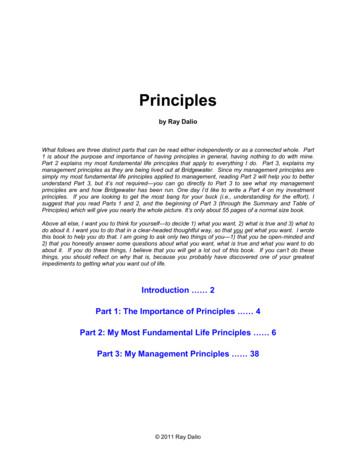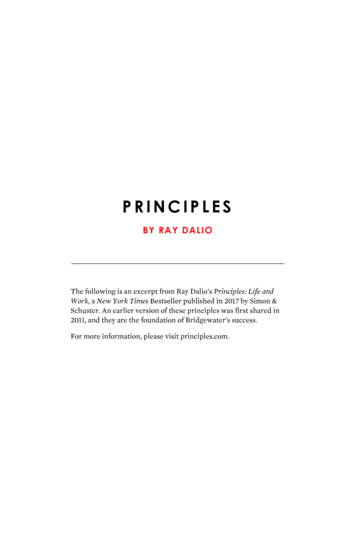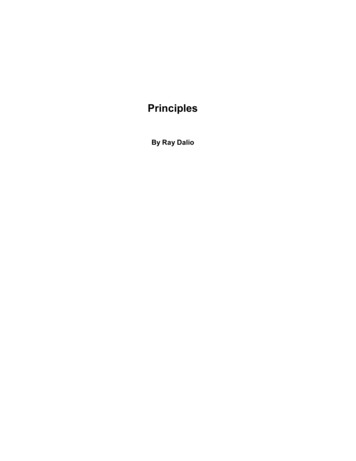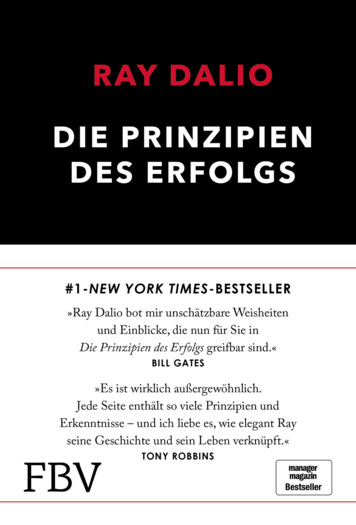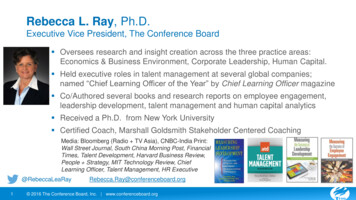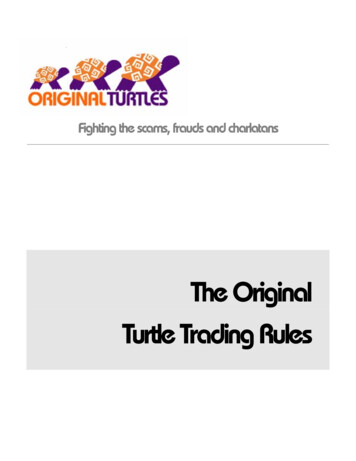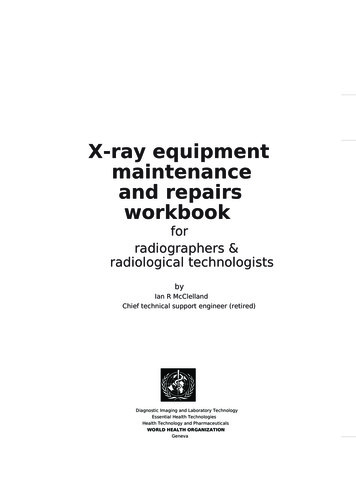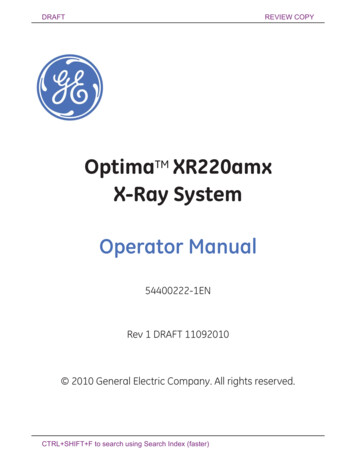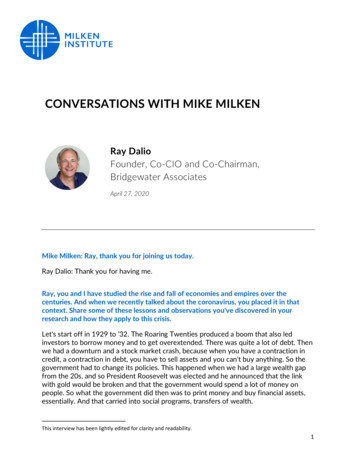
Transcription
CONVERSATIONS WITH MIKE MILKENRay DalioFounder, Co-CIO and Co-Chairman,Bridgewater AssociatesApril 27, 2020*Mike Milken: Ray, thank you for joining us today.Ray Dalio: Thank you for having me.Ray, you and I have studied the rise and fall of economies and empires over thecenturies. And when we recently talked about the coronavirus, you placed it in thatcontext. Share some of these lessons and observations you've discovered in yourresearch and how they apply to this crisis.Let's start off in 1929 to ’32. The Roaring Twenties produced a boom that also ledinvestors to borrow money and to get overextended. There was quite a lot of debt. Thenwe had a downturn and a stock market crash, because when you have a contraction incredit, a contraction in debt, you have to sell assets and you can't buy anything. So thegovernment had to change its policies. This happened when we had a large wealth gapfrom the 20s, and so President Roosevelt was elected and he announced that the linkwith gold would be broken and that the government would spend a lot of money onpeople. So what the government did then was to print money and buy financial assets,essentially. And that carried into social programs, transfers of wealth.This interview has been lightly edited for clarity and readability.1
Conversations with Mike Milken: Ray Dalio, April 27, 2020The same thing was happening around theworld, but in different ways. In Germany theyhad this depression and then Hitler came topower in 1933, and that was because theywere fighting with each other internally,fighting mostly over wealth. Because of thechaos and the difficulties, they wanted anautocratic leader and gave special powers toHitler. And then that led to the wars and thechallenges. After the war, they set up a newmonetary system.“A financial bomb has gone off.And then you have to say, okay,who are you going to help first? Choices have to be made. The realquestion is whether we can do thattogether in a bipartisan way, in askillful way, because there'senough money and credit to goaround and this can be done.”In 1945 we began the new world order, andthe United States was the leader of thatworld order, and the U.S. dollar. That'sbecause the United States has 80% of the world's gold stocks. And we began a newbeginning, and I remember a lot of it well. I'm 70 years old. I was born in 1949, and Icame into a world where there was equal opportunity and our country was workingtogether and we were a rich country where the dollar was dominant. And we carried thatforward.Well, the same things happened again: we got more overextended. We had the 2008financial crisis with interest rates hitting zero. When they hit zero, like in 1929 to ‘32, wehad a downturn and then central banks came in and they printed money and theybought financial assets. And that caused a rally, and we had the wealth gap. And so on.So now we have a downturn caused by an act of nature. But whatever causes it, we havea situation where there are shortages of incomes, hits to balance sheets, and like inMarch of 1933, the government is giving that money to fill in those holes. And we havethe United States government taking that lead.You have laid out history here, and so the goal is to make sure that the negative parts ofhistory are not repeated. We're going to deploy trillions of dollars. One of the thingsI've learned, when you treat cancer patients, quite often cancer patients want to do theleast possible at the beginning and hope it works and then at the end, in reoccurance,are willing to do anything. So we have to make sure that we've made enough of aninvestment here to stabilize our economy.Because the United States has the world's central bank, because the U.S. dollar is theworld's reserve currency, the federal government can take that money and borrow itfrom the federal reserve and then target it where it wants to. And it's going to have tomake choices. And those choices are going to be difficult choices.2
Conversations with Mike Milken: Ray Dalio, April 27, 2020Think of this as almost like a bomb has gone off. A financial bomb has gone off. And thenyou have to say, okay, who are you going to help first? And in what way? When stateshave falls in their tax revenue, and have more expenses, will they get money? Whatcompanies will get money? Who will be saved? It's going to be a politically challengingjob – did you save this one? and why didn't“Now we have a downturn caused by you save that one? – a lot of argumentsalong those lines.an act of nature. But whatevercauses it, we have a situation wherethere are shortages of incomes, hitsto balance sheets, and – like in Marchof 1933 – the government is givingthat money to fill in those holes. Andwe have the United Statesgovernment taking that lead.”So those kinds of choices have to be made.The real question is whether we can dothat together in a bipartisan way, in askillful way, because there's enough moneyand credit to go around and this can bedone. The best things that the money cango to are those things that produceproductivity in a well-shared way.Investing in people so that there'sexcellent-quality education. There's alsothe teaching of values and character and then coming out into a world in which there issomething like equal opportunity. It's never going to be perfect, but we strive for asystem that people feel is fair. I think that that's going to be the most fundamentalnecessity, not just because I experienced it and I've seen it, but I've studied like you say,these dynasties. So, we're going to have to invest in that I think.This health crisis has decimated hundreds of millions of lives who have not gotten thevirus itself, but they’ve seen the government shut their businesses – their littlerestaurants, the dry cleaner, whatever it might be. Is this a race, in some way, betweenhuman inventiveness and nature? How do you envision this story ending?That's of course the big question. You see throughout history that some of the greateconomic and social conflicts and wars had nature causes to them. There's pandemicsand diseases, floods, droughts and so on. This one is global because a pandemic is global.Changes in climate will be global.Human intelligence is enormous. I'd still bet on nature. Nature is brilliant. Man does nothave the intelligence probably to make a mosquito and all of the other things that arepossible. So I wouldn't want to mess with nature.We both believe in expanding the pie, expanding the economy, expandingopportunities, but I know you feel very strongly we need to slice the pie differently.3
Conversations with Mike Milken: Ray Dalio, April 27, 2020Talk about the role of inequality as you see it. How is it magnified during thecoronavirus?Throughout all of history, what causes revolutions is large wealth gaps, large opportunitygaps and systems that people believe are not fair. You want to enable as many people asis possible to have equal opportunity of education. That's number one. And thenestablishing a minimum acceptable living standard and poverty level that they can't gobelow, particularly their children – children should not be in violent poverty levels. Thosethat are incapable because of one reason or another have a minimum living standard –just civility – others’ children growing up have got to have those basic elements. And wehave the capacity to do that. If you look at what money’s spent on, the resources, if wego back and think that's fundamental, and that a lot of the luxuries we spend money onare less important, I think we could do that.We live in a country where people talk about the American Dream. As you know, forthe last six years we've been working on this Center for Advancing the AmericanDream, that dream of a chance to succeed. We’ve been very concerned about thechallenge to the American Dream, where people don't feel they have a chance toachieve it, which is why this center's called Advancing the American Dream. Ray, yourown life in many ways is symbolic of the American Dream. I know you've studied issuesof society, not just financial. How do we reaffirm that every person feels that they havea chance at this American Dream, which is what the country stands for, and how otherpeople around the world look at the United States. What has this crisis, not just a healthcrisis, but this economic crisis that's been brought on, what does it do to this concept ofachieving the American Dream?I'm not sure that Americans know what theAmerican Dream is or whether there's aclear definition of what the AmericanDream is. We were born right after the newworld order began in 1945, and we livedthat dream, which was equal opportunity,equal education – those basic things.I think in my mind I know what theAmerican Dream is. And in your mind youknow what the American Dream is. But justbecause it's in our mind, I don't know thatwe've agreed as a society that that's theAmerican Dream. Because if we did – if wesaid equal opportunity is fundamental tothe American Dream, and then we said,how are we doing in relationship to that,“You want to enable as manypeople as is possible to have equalopportunity of education. That'snumber one. And then establishinga minimum acceptable livingstandard and poverty level thatthey can't go below, particularlytheir children – children should notbe in violent poverty levels. Ithink we could do that.”4
Conversations with Mike Milken: Ray Dalio, April 27, 2020you would look at the schools that I'm referring to or the differences in spending and soon. We would know that we've lost sight of that beacon – that we're not delivering onthat American Dream. I don't know that if you were to take a survey and everybody sayswhat is the American Dream that they would answer. So I think it starts with thequestion of what is our common dream? What is our common mission? What are wetrying to achieve? I don't know that we have that.I think, Ray, that's why we use the word advancing, because we need to find out how toreaffirm that upward mobility today. I remember when I was very young, my father toldme if everyone didn't feel they had a chance to a good life, that my children wouldn'thave a good life. And I think you're underlining that. I'd like to end where we startedtoday. Enormous economic dislocation. Fear of a continued spread of a pandemic. Asone of the world's leading money managers responsible for pensions of so many people,or retirement savings or just people's investments, how have you led your own firmduring the last few months and what are you telling your employees?These are stress tests. They're in a way very good for us because they identifyvolatilities. Then diversify well. The most important thing through this is to know offenseand defense, to know opportunity and to know risk reduction. So from a business pointof view or for an investing point of view, have enough cushion, have enough safety, andthen it's all who you're on the mission with, how their character and their capabilities torelish the tests even though they'redifficult because we'll come out of that in“You see throughout history that somea better way.of the great economic and socialDiversification is very important, and toconflicts and wars had nature causesunderstand that from an investmentpoint of view in the broadest way. Toto them. Human intelligence isunderstand what monetary policy – theenormous. I'd still bet on nature.”printing of money – means. Tounderstand how to balance theportfolios. And to recognize, to have enough wealth and to have it well enoughdiversified, as the fundamental underpinning of investing. And then to take your betsfrom there.Ray, you always provide a great deal of wisdom and, in many cases, unconventionalwisdom. And your knowledge of history has served you well over the years. I want tothank you for joining us today, and we appreciate your insights.Thank you, Mike. It's always a pleasure to do it with you.5
Ray Dalio Founder, Co-CIO and Co-Chairman, Bridgewater Associates April 27, 2020* Mike Milken: Ray, thank you for joining us today. Ray Dalio: Thank you for having me. Ray, you and I have studied the rise and fall of economies and empires over the centuries. And when we recently talked about the coronavirus, you placed it in that context. Share some of these lessons and observations you've .
